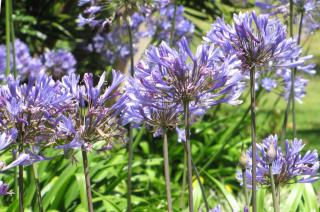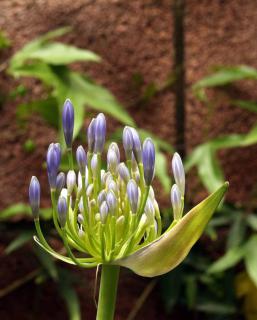

Whether white or blue, directly in the ground or in pots, plant Lily of the Nile ! Thanks to the different varieties, every region can avail of these beautiful flowers.
The scientific name of the plant means “plant of love” in ancient greek: Agapanthus. With elegant umbels perched atop tall scapes, this flower is known for indigo or deep blue colors, a great source of inspiration for the painter Monet.
Brought North from South Africa by explorers from Holland in the XVIIth century, this plant is prized in mild climate areas, like along the Mediterranean or the Atlantic, because it isn’t considered very hardy.
But new hybrid varieties have changed that, like the ‘Headbourne’ that can cope with temperatures as low as -4°F (-20°C).
It is best to plant Lily of the Nile in the spring or at the beginning of fall.
Choose the variety best suited to your climate:
 Place your plant in the sun in well drained soil, not too near trees that might block the light.
Place your plant in the sun in well drained soil, not too near trees that might block the light.
You may also plant them in pots, with a mix of ⅓ garden soil, ⅓ soil mix for geraniums and ⅓ river sand, on a thick layer of clay pebbles.
Water regularly over the first year (wait for the soil to dry before watering again) and cover with horticultural fleece over the two first winters.
Every spring, add potassium-rich fertilizer, ashes and compost for instance.
After flowering, cut the flowers at ground level, Agapanthus will bloom anew in the following spring.
 Since they bloom all summer long, Lily of the Nile are great in flower beds together with grasses and summer flowering bulbs like Crocosmia. The fiery red of this flower lays the scene for epic battles between fire and water in the scenery.
Since they bloom all summer long, Lily of the Nile are great in flower beds together with grasses and summer flowering bulbs like Crocosmia. The fiery red of this flower lays the scene for epic battles between fire and water in the scenery.
Use blue lilies of the Nile to enhance a body of water, stand out against painted shutters, surround a blue garden table set…
Laure Hamann, minor edits by Gaspard